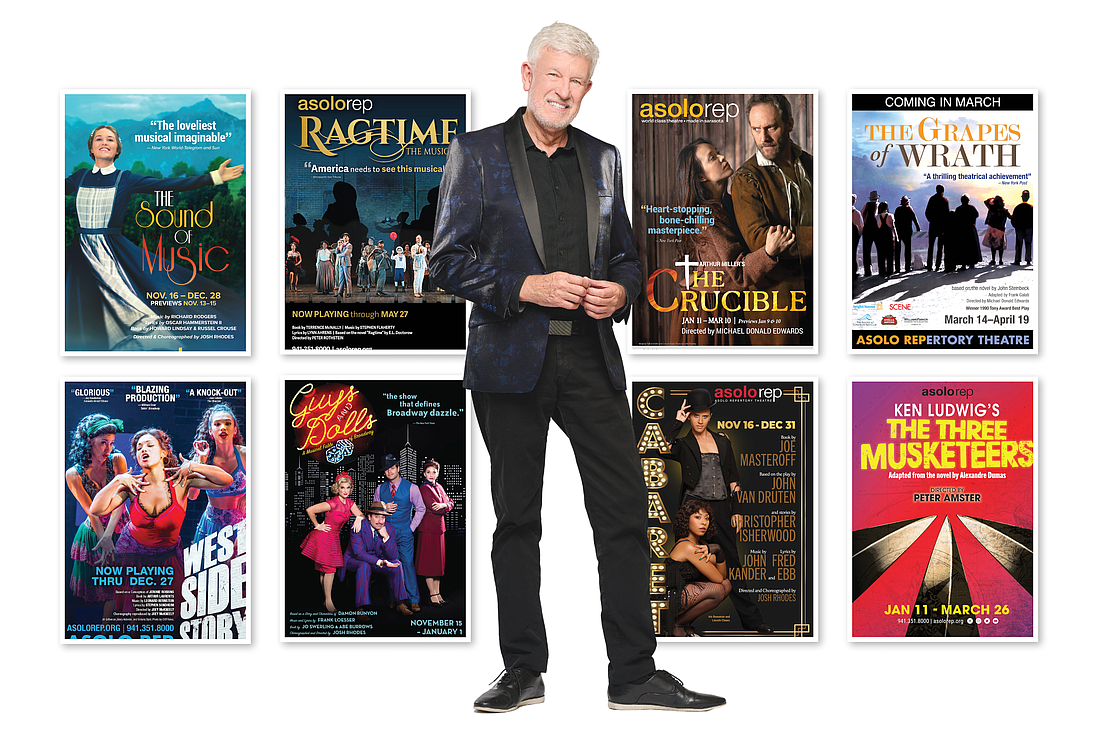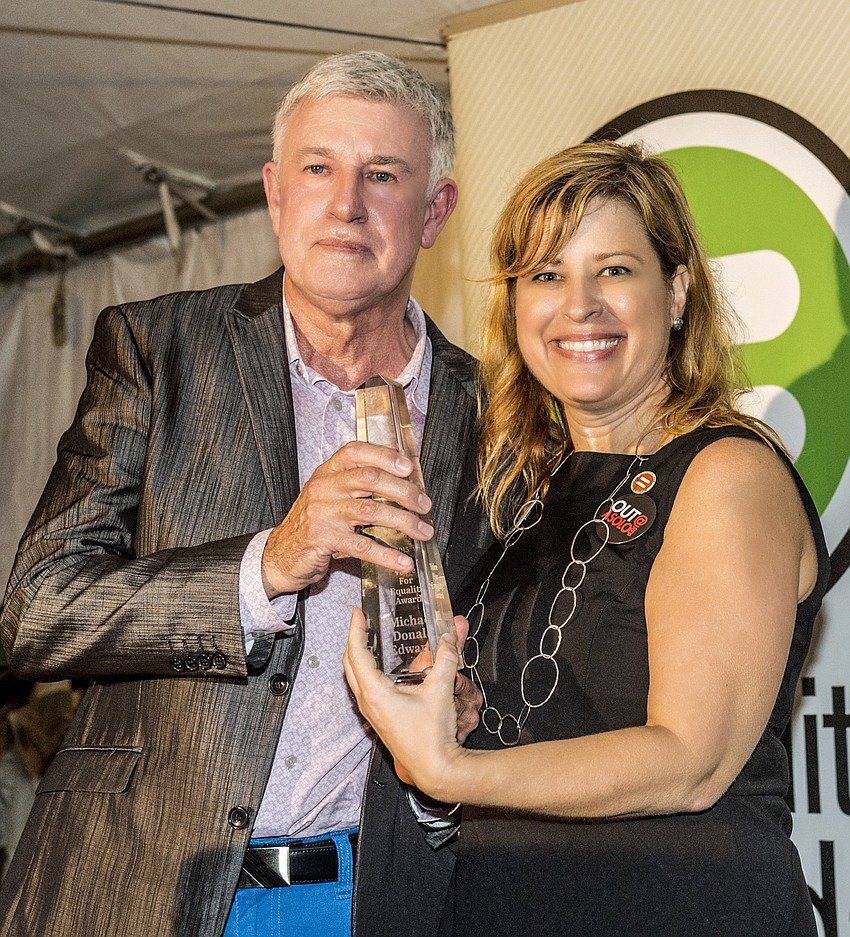- July 26, 2024
-
-
Loading

Loading

Michael Donald Edwards is taking his final bow as Asolo Rep’s producing artistic director.
He’s not the same as when he arrived in Sarasota. Neither is the theater company.
Over the course of his 18-year run, Edwards profoundly transformed Asolo Rep and developed a new skillset in the process. Under his stewardship, the theater company upgraded its audio, visual and lighting technology. It expanded spaces for rehearsals and storage for sets, props and costumes and added residences for visiting actors.
By strengthening the theater company’s relationship with Sarasota's philanthropic community, Edwards was instrumental in raising money for the improvements.
Howard Millman was Asolo Rep’s first managing director from 1968 to 1980 and then its producing artistic director from 1995 until 2006. He applauds the way Edwards brought the company into the future during his tenure. “When I returned to the Asolo, my job was to keep it alive and breathing,” Millman says. “Michael’s job was to grow the company — and he did that brilliantly. I’m thrilled at the direction he took the Asolo. He did a great job.”
Millman and others agree that Edwards made a profound impact on the company. He was clearly an agent of change. But he had no grand design in mind on day one.
Edwards says he had a positive impression of Asolo Rep before accepting the position as its producing artistic director in 2006. But it was an outsider’s point of view. He had previously been the associate artistic director of Syracuse Stage and served as artistic director of Shakespeare Santa Cruz. In 2005, he came to Sarasota to guest-direct the Asolo Rep’s production of Michele Lowe’s “The Smell of the Kill.” But directing was Edwards’ only connection to the company when he began his leadership role.
“I was originally focused on directing,” he says. “I discovered that producing and fundraising for one of our nation’s leading performing arts organizations was just as interesting and rewarding.”
In his early years as Asolo Rep’s producing artistic director, Edwards still thought like a director. He focused on the plays he’d be directing, not the big picture.
“My idea of creating a season was picking shows that I wanted to direct,” he said in an interview with the Observer. “I directed three plays in my first two seasons. I don't know how I did it, but it’s what I really wanted to do.”
How did he plan to transform Asolo Rep?
“That question came up repeatedly,” Edwards recalls. “The people surrounding me kept asking me that — board members, theater supporters, actors. What did the Asolo lack? How would you change the company? I made changes, yes. But I didn’t originally have them in mind.”
Edwards’ focus gradually expanded. Jill Santoriello’s “A Tale of Two Cities” accelerated his big-picture thinking. Santoriello’s musical theater adaptation of Dickens’ classic was Broadway-bound. In the fall of 2007, it was still in the “tryout” phase — theater lingo for a test drive in off-Broadway venues before its official launch. The Asolo Rep production would be one of its tryouts.
While the kinks were still being worked out on the musical in Sarasota, it became apparent that Asolo Rep’s theater was unequipped to seamlessly produce a play designed for the Great White Way, Edwards directed the ambitious production and struggled to meet its demanding standards. That experience revealed exactly what Asolo Rep lacked.
“Asolo’s performance space at the FSU Center for the Performing Arts wasn’t up to Broadway standards,” he says. “Our existing sound system was woefully inadequate, as was most of our aging technology. To stage this musical properly, all the equipment had to be enhanced, rented or bought.”
That’s just what Edwards did. The price tag was steep, but the results were worth it. According to Edwards, “A Tale of Two Cities” was a “massive” hit. To stage it properly, he had upgraded the theater company's facilities. Those upgrades didn’t vanish when the musical left town. In the long term, Asolo Rep could now stage more ambitious musicals.
That possibility raised a tantalizing question: What else was possible?
“The musical became a portal to change,” Edwards says. “Over time, it led to upgrades of every aspect of the institution and its infrastructure.”

As Edwards describes it, a positive feedback loop was established. Broadway-quality, commercially successful productions would expand Asolo Rep’s audience. The resulting income would be used to improve production capabilities. The company could then stage even more ambitious plays, and further expand its audience. And so on.
Now Edwards had a vision. He still had the mind of a director. But he also began to act like an artistic director. That meant thinking like a producer and a showman and becoming the public face of the company. Incubating nationally significant plays and musicals would be the result.
Edwards’ focus shifted to community engagement, production quality and fundraising. He cultivated relationships with area philanthropists. Thanks to their support, Edwards began to make his vision a reality.
Simply put, he identified what Asolo Rep lacked. And got to work filling the gaps.
Asolo Rep’s physical plant was a big missing puzzle piece. Several, actually. Its backstage infrastructure at the FSU Center for the Performing Arts was not up to par. After “A Tale of Two Cities,” Edwards continued to upgrade its lighting, audio, visual projection, and other technological capabilities — and bring them to the cutting edge.
The company also lacked a dedicated rehearsal space and rented its cramped, off-campus scene shop. In 2012, Edwards filled this gap with the Robert and Beverly Koski Production Center on Tallevast Road. That facility now comprises rehearsal studios, along with scene and costume shops to design and store sets, props and costumes. (It’s still a work in progress.)
The company also bought 10 condominiums in Serenata for visiting actors to live while they were in town.
During the height of the pandemic, Edwards made sure that Asolo Rep’s show went on with an exterior Terrace Stage. Its 2020-21 outdoor season included a condensed version of Lerner and Loewe’s musical “Camelot” and a rolling world premiere of a new play, "The Music and Life of Fannie Lou Hamer," celebrating the civil rights activist's life and legacy.
While Asolo Rep remained a safe place for Molière and Shakespeare, Edwards also made it a launching pad for Broadway musicals like “Bonnie and Clyde.” (Some were flops, a few were hits. But that’s show biz.) The company’s Ground Floor initiative also nurtures work by new playwriting talent, with a special focus on the voices of marginalized identities, communities and origins.
Under Edwards’ leadership, Asolo Rep paid down debt on its existing facilities. He cultivated relationships with area donors like Robert and Beverly Koski and the late Warren and Margot Coville. Edwards didn’t depend solely on philanthropy and based his operating budget on a diverse revenue stream. In 2019, his “Staging Our Future” initiative set a target of $21 million for the company’s endowment. Asolo Rep has now raised 85% of that goal.
As Edwards sees it, marketing, fundraising and philanthropy were vital to achieving his artistic vision for Asolo Rep. It might be commercialism — but it’s how he made his vision real.
“Our healthy financial status is a means to an end,” he says. “It wouldn't mean anything if we weren’t staging passionately exciting plays and musicals by the best talent working today.”
In Edwards’ view, it’s all about the art. In the beginning, that revolved around his artistry as a director. He’s proud of his work on “Equus” and “A Tale of Two Cities.” But Edwards is equally proud of empowering directors like the late Frank Galati, Peter Amster and Josh Rhodes in musicals like “Ragtime,” “The Three Musketeers” and “The Sound of Music," respectively, on the Asolo Rep stage.
The directors Edwards has worked with feel just as proud to have worked with him. Amster is one of them. “For me, working with Michael has been a learning experience,” he says. “It’s been like having a tennis pro teach you how to play tennis. He’s challenged me; he’s inspired me; he’s supported me creatively in the process of directing. We have very different styles, but he can pinpoint exactly why something’s not working and how to fix it. What more could a director ask for?”
On June 30, Edwards will cross the finish line of his long-distance run at Asolo Rep. “I never expected to be here this long,” he laughs. “I signed a three-year contract and stayed for 18.”
Peter Rothstein’s run as Asolo Rep’s new artistic director begins the moment Edwards leaves the theater company. Edwards’ advice to his successor? “Stick to your vision, but enjoy the conversation with the community.”